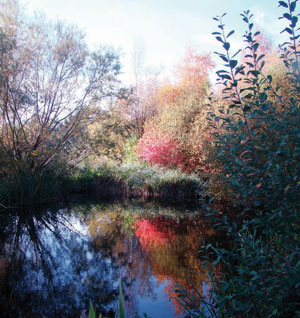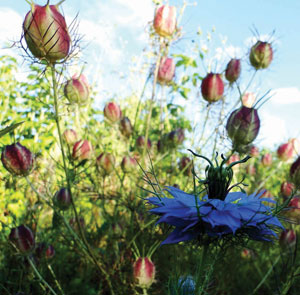Art is the currency of experience
Debate about art and its value is often trapped in the traditional language of the money economy. Bill Sharpe suggests bringing economics back where it belongs – inside ecology


When you think about economy what comes to mind? Do you think about the way a woodland or a meadow is a complex sharing of resources among many living beings, some that help each other and some that compete? Or do you immediately think about money, markets, buying and selling, and the current financial crisis? Most people think of the latter, and if asked to connect economy and ecology see them as belonging to two worlds that are in some way opposed to each other. This way of thinking – pitting economics against ecology – has become deeply embedded in our everyday language and makes it very hard for us to think properly about any value in our lives other than that of money. The arts suffer particularly from this, but so do many other parts of our lives such as health and well-being and the natural environment. We need a better way to talk about value that is about more than exchanging things in the marketplace, and the key to this is to put economics back where it belongs, inside ecology.
If you look in the Oxford English Dictionary you will find ecology defined as ‘the science of the economy of plants and animals’. This is very helpful as it reminds us that economic thinking is just a way of looking at patterns of shared life made up of overlapping webs of value, each web centred on a particular life. The economics of the market describes how we each have our own values for the things that we trade, so we are willing to exchange one thing for another or for money. The extended pattern of trading that money enables makes up the market for the economy of money. Instead of thinking of this pattern as ‘the’ economy we can regard it as just one economy within the overall ecosystem of our lives. We do not need to put the economy of money in opposition to ecology, just relegate it to only one economy amongst many.
Once we make this shift from one economy to many, all within a single ecological understanding of life, then we can see other economies and currencies that support our shared lives, and think about the relationships between them. For example, our democratic systems rely on a currency of votes. This currency is just as carefully protected by governments as the currency of money, with strict controls on how it is issued and the conditions of use. We all use it to convert our individual judgements of political value into a shared decision on the allocation of power and resources. It is interesting to note the relationship to the economy of money; voting is properly used to allocate resources including money, but we regard it as corrupt for money to purchase votes. The money must be kept at the margins of the voting system, not influence its proper functioning. Scores in sport work in a similar way, linking up games into a competitive league. You use money to get in to a match, but should not use it to influence the game, and sporting governance is just as important in preserving the currency as it is for money. What matters is the integrity of the currency and the economy it supports.
So what has all this got to do with art? Each of us has our own unique experience of being human that we contribute to the ever-changing pattern of human culture. From birth to death, in every choice of our words and acts, we work like an artist, expressing one meaning of what it is to live a life. We are the artists of our lives. Whenever we hear a story, sing a song, enjoy a picture we create a fresh relationship between that work of art and our human life – a contribution that only we can make. Art puts our experiences in motion amongst us: it weaves individual lives into the economy of human meaning. Anything can become money if we use it to trade, and anything can become art if it moves from being a moment of private expression to circulating among us as a way to share the experience of human life. Art is the currency of experience.
The power of a currency is that it promotes both unity and diversity: unity in a way of relating collectively to the world and infinite diversity of individual responses to that possibility. Art carries this process into every aspect of our lives, giving us ways to expand our response to the moment before us and giving that response back to our culture as a resource for others.
Each currency and its economy is quite distinct, and it really makes no sense to try and convert one to another – what meaning could we give to how many votes are equivalent to a win in a game of football? There is not one meaning to the term ‘value’ – and it certainly is not determined by any one economy to the exclusion of others. Value arises as a perspective on life, and all life is lived in patterns of relationship. By reclaiming ‘economy’ for all these patterns, not just for money, we can perhaps have a richer dialogue about true wealth in our lives.
Join the Discussion
You must be logged in to post a comment.